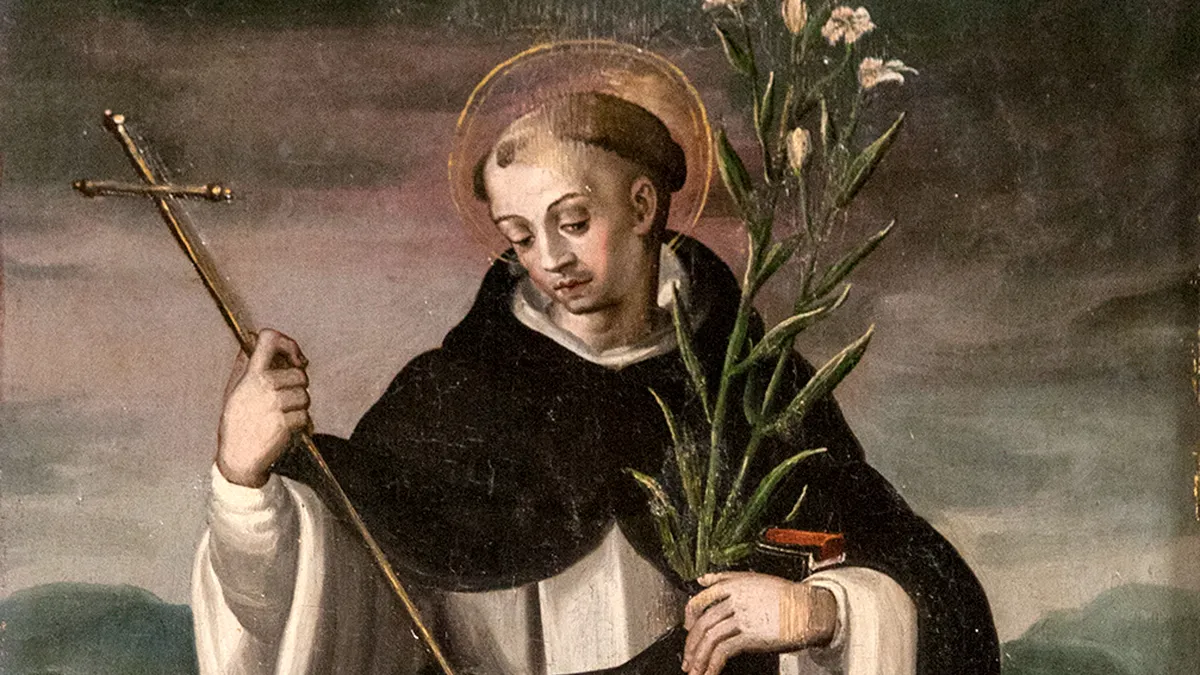Saint Dominic: The Preacher of Grace Who Ignited the Flame of Truth
Feast Day: August 8th
In an era shadowed by heresy and spiritual confusion, one man's unyielding zeal for the Gospel illuminated the path to renewal. Saint Dominic de Guzmán, founder of the Order of Preachers, emerged as a beacon of orthodoxy and mercy in the early 13th century. Born around 1170 in Caleruega, Spain, to a noble family—his father Felix de Guzmán the royal warden and his mother Blessed Joan of Aza renowned for her holiness—Dominic's life was marked from the start by divine providence. As a child, he displayed extraordinary piety, and his education at the University of Palencia honed his intellect while deepening his compassion for the poor. In a famine-stricken time, he famously sold his precious annotated books, declaring, "I could not bear to prize dead skins, when living skins were starving and in need."
Dominic's priestly ordination around age 25 led him to join the canons regular at Osma, where he embraced the Rule of Saint Augustine and a life of contemplation. But his destiny shifted in 1203 during a diplomatic mission with Bishop Diego d'Azevedo. Traversing southern France, they encountered the rampant Albigensian heresy, which denied the goodness of creation and the sacraments. Shocked by the spiritual peril, Dominic spent an entire night debating an innkeeper, converting him through reasoned discourse and prayer. This encounter ignited his lifelong mission: to combat error not with force, but with truth and humility. He rebuked those who relied on worldly might, insisting, "The enemies of the faith cannot be overcome like that. Arm yourself with prayer instead of a sword; be clothed with humility instead of fine raiment."
In 1206, Dominic founded his first community at Prouille, a convent for women rescued from heresy, emphasizing enclosure, penance, and contemplation to support apostolic work through prayer. As the Albigensian Crusade unfolded violently, Dominic stood apart, advocating mercy. During the Battle of Muret in 1213, he prayed fervently from afar, and victors credited his intercession for their success. Refusing bishoprics multiple times—he once said, "I would rather take flight in the night, with nothing but my staff, than accept the episcopate"—Dominic focused on forming a new order dedicated to preaching.
By 1215, with Bishop Foulques of Toulouse's support, Dominic gathered followers in a humble house, adopting the Augustinian Rule and emphasizing poverty, study, and itinerant preaching. Pope Innocent III initially hesitated due to the Fourth Lateran Council's restrictions on new orders, but his successor, Honorius III, confirmed the Order of Friars Preachers in 1216, hailing them as "the champions of the faith and the true lights of the world." Dominic dispersed his small band of 17 friars to key European centers like Paris and Bologna, prioritizing universities to equip preachers with theological rigor. His vision integrated contemplation and action, encapsulated in the motto "contemplata aliis tradere"—to hand on to others what is contemplated.
Dominic's travels were relentless: establishing foundations in Spain, France, and Italy, converting thousands, and fostering Marian devotion, including the Rosary, which tradition links to him. Miracles punctuated his ministry, such as a fire consuming heretical texts but sparing his own, or bread multiplying for his friars. He taught self-mastery, advising, "A man who governs his passions is master of the world. We must either rule them, or be ruled by them. It is better to be the hammer than the anvil." In 1221, worn by austerities, he fell ill in Bologna. On his deathbed, he comforted his brethren: "Do not weep, for I shall be more useful to you after my death and I shall help you then more effectively than during my life." His final bequest was simple: "These, my much loved ones, are the bequests which I leave to you as my sons; have charity among yourselves; hold fast to humility; keep a willing poverty." He died on August 6, 1221, at age 51.
Canonized swiftly in 1234 by Pope Gregory IX, who declared, "I no more doubted the saintliness of Saint Dominic than I did that of Saint Peter and Saint Paul," Dominic's legacy endures through the Dominicans, champions of theology and evangelization. Pope Benedict XVI praised him as a reminder that "in the heart of the Church a missionary fire must always burn," emphasizing his blend of study, poverty, and preaching. Pope Francis, commemorating the 800th anniversary of Dominic's death, called him "Praedicator Gratiae," noting, "Dominic responded to the urgent need of his time not only for a renewed and vibrant preaching of the Gospel, but, equally important, for a convincing witness to its summons to holiness." He highlighted Dominic's zeal: "His zeal for the salvation of souls led him to form a corps of committed preachers whose love of the sacred page and integrity of life could enlighten minds and warm hearts with the life-giving truth of the divine word."
Saint Dominic's life compels us today: in a world rife with doubt, his example urges us to wield truth with mercy, prayer over power, and contemplation as the wellspring of action. Through his intercession, may we too become preachers of grace.
References
- Catholic Encyclopedia: St. Dominic (New Advent)
- Pope Benedict XVI: General Audience on Saint Dominic Guzmán (Vatican.va)
- Saint Dominic, Founder of the Friars Preachers (EWTN)
- Pope Francis: Letter on the VIII Centenary of the Death of Saint Dominic (Vatican.va)
